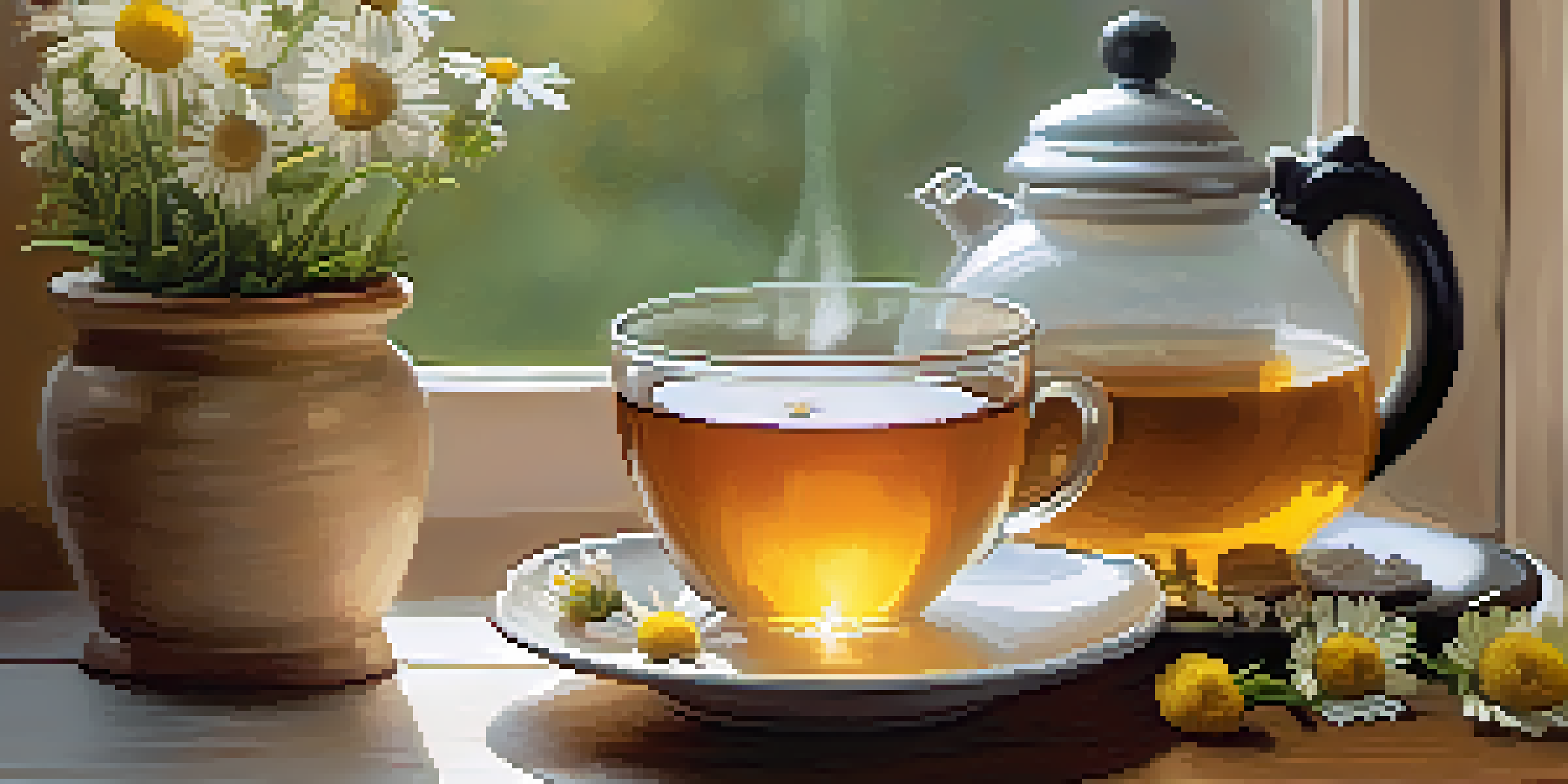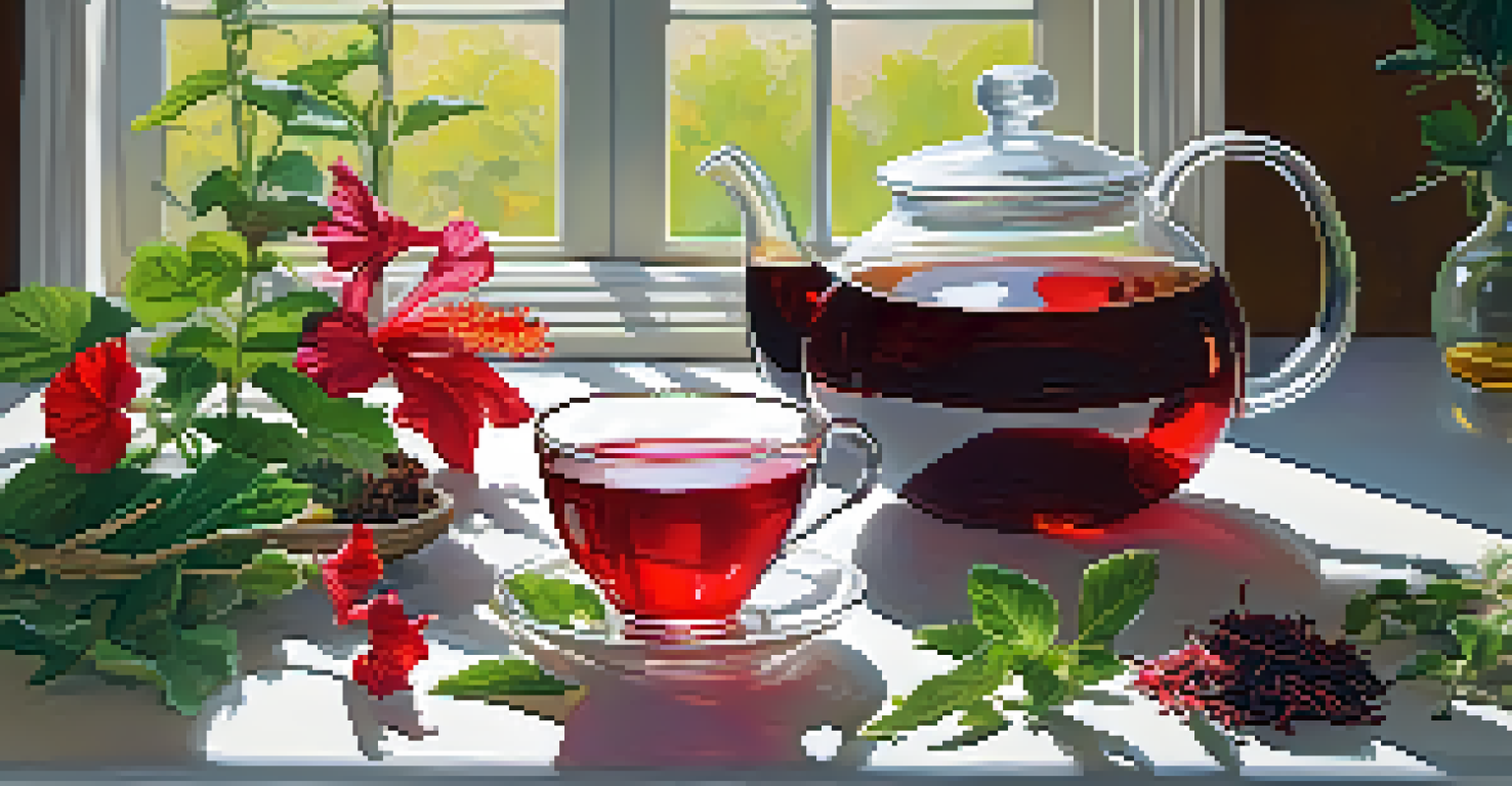Herbal Teas: Benefits and Best Plants for Natural Healing

Understanding Herbal Teas and Their Healing Powers
Herbal teas have been cherished for centuries, not just for their delightful flavors but also for their numerous health benefits. Unlike traditional teas derived from the Camellia sinensis plant, herbal teas are made from a variety of dried herbs, flowers, fruits, and spices. This makes them caffeine-free and a great choice for those looking to unwind or seek natural remedies.
Herbal medicine is a great place to start for those who want to become more proactive about their health.
The beauty of herbal teas lies in their diversity; each type offers unique properties. For example, chamomile is often lauded for its calming effects, while peppermint can aid digestion. This variety allows individuals to tailor their tea choices to meet their specific health needs or preferences.
Incorporating herbal teas into your daily routine can be as simple as swapping out your usual coffee or black tea. Not only can this lead to a more balanced lifestyle, but it can also introduce a world of flavors and aromas that enhance your overall well-being.
Key Benefits of Drinking Herbal Teas Regularly
One of the standout benefits of herbal teas is their potential to support various bodily functions. For instance, ginger tea is known for its anti-inflammatory properties, making it a popular choice during cold and flu season. Similarly, teas like hibiscus can help maintain healthy blood pressure levels.

Moreover, herbal teas are rich in antioxidants, compounds that help combat free radicals in the body. This can lead to improved skin health, enhanced immunity, and even reduced risk of chronic diseases. By sipping on these brews, you’re not just enjoying a warm drink; you’re also investing in your health.
Herbal Teas: A Healthier Choice
Herbal teas offer a caffeine-free alternative to traditional beverages, packed with unique flavors and health benefits.
Additionally, many herbal teas can provide a moment of mindfulness in our busy lives. Taking the time to brew and savor a cup can serve as a gentle reminder to slow down and care for ourselves—body and mind.
Popular Herbal Teas and Their Specific Benefits
When it comes to herbal teas, the options are nearly endless. Some popular choices include chamomile for relaxation, peppermint for digestive aid, and rooibos for its anti-aging properties. Each tea offers its own unique set of benefits, making it important to choose one that aligns with your health goals.
Tea is the magic key to the vault where my brain is kept.
For example, if you're struggling with anxiety, a warm cup of chamomile tea before bed may help soothe your nerves and promote better sleep. On the other hand, if you're looking for a refreshing drink to combat fatigue, hibiscus tea can be a vibrant, energizing option packed with vitamin C.
Exploring these different herbal teas can turn into a delightful adventure. You might find that trying new blends not only enhances your health but also adds a touch of excitement to your daily routine.
Herbs that Make the Best Herbal Teas for Healing
Certain herbs have gained popularity for their remarkable healing properties. For instance, echinacea is often used to boost the immune system, making it a staple during flu season. Likewise, nettle tea is rich in vitamins and minerals, providing a natural energy boost.
Another fantastic herb is lemon balm, known for its calming effects on the mind and body. Drinking lemon balm tea can help reduce stress and improve mood, making it a great addition to your evening routine. These herbs not only taste great but also offer a plethora of health benefits.
Mindful Moments with Herbal Teas
Incorporating herbal teas into your routine can create opportunities for mindfulness, promoting relaxation and self-care.
Incorporating these healing herbs into your life can be as simple as brewing a pot of tea each day. Over time, you’ll likely notice a positive impact on your overall well-being, making each cup feel like a small act of self-care.
How to Brew the Perfect Cup of Herbal Tea
Brewing herbal tea is an art that can significantly influence the taste and benefits you receive. Start by using fresh, high-quality herbs or tea bags, as the freshness directly impacts the flavor and potency. A general rule of thumb is to use about one teaspoon of dried herbs per cup of water.
Once you have your herbs ready, bring water to a boil, then let it cool slightly before pouring over the herbs. Allowing the tea to steep for 5 to 10 minutes will help extract the full range of flavors and benefits. Feel free to adjust the steeping time based on your taste preference—longer steeping yields a stronger flavor.
Finally, don’t hesitate to personalize your tea! Adding a splash of honey or a squeeze of lemon can enhance the taste and boost health benefits, making your tea-drinking experience even more enjoyable.
Common Misconceptions About Herbal Teas
Despite their popularity, herbal teas are often surrounded by misconceptions. One common myth is that all herbal teas are caffeine-free. While many are, there are some exceptions, such as yerba mate, which does contain caffeine. It’s essential to read labels and understand what you’re consuming.
Another misconception is that herbal teas can cure ailments on their own. While they can support health and wellness, they should not replace professional medical advice or treatment. It’s best to view herbal teas as complementary to a healthy lifestyle rather than a sole remedy.
Misconceptions About Herbal Teas
It's important to understand that while herbal teas can support health, they should not replace professional medical advice.
Understanding these misconceptions helps ensure that you approach herbal teas with realistic expectations. By incorporating them wisely into your routine, you can enjoy their benefits while maintaining a balanced view of health.
Incorporating Herbal Teas into Your Daily Routine
Making herbal teas a part of your daily routine can be both simple and enjoyable. Start by selecting a few favorite blends that resonate with your health goals or flavor preferences. This can create a personal ritual that enhances your day and promotes wellness.
Consider setting aside specific times for tea breaks, whether it’s in the morning to kickstart your day or in the evening to unwind. These moments can serve as a lovely pause, allowing you to reflect, relax, and feel more connected to your body and mind.

Furthermore, sharing your herbal tea experience with friends or family can encourage a sense of community and support. You might even discover new blends together, expanding your herbal tea journey while fostering deeper connections.